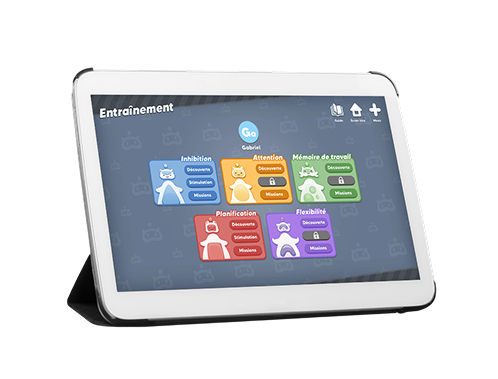All you need to know about the Neuropsychologist
When is it time to consult a Neuropsychologist?Neuropsychology explained for parents
The signs I notice in my child
Certain behaviors or difficulties may lead you to consult a neuropsychologist:
- Difficulty concentrating or a tendency to daydream or seem to have their head in the clouds
- Impulsive behaviors or intense reactions at school or at home
- Possible signs of ADHD (inattention, restlessness, difficulty following instructions)
- Emotional or behavioral issues (anxiety, frequent anger, aggression)
- Developmental delays in cognitive, social, or language skills
- Persistent academic difficulties despite effort (reading, writing, math, etc.)
- Suspected learning disorders (dyslexia, dysorthographia, etc.)
- Need for an assessment after a head injury or neurological condition
- Questions about possible high intellectual potential (giftedness)
- Lack of self-confidence related to a lack of understanding of one’s own functioning
The role of the Neuropsychologist
A neuropsychologist is a psychologist who specializes in how the brain functions and how learning takes place.
They carry out assessments to better understand a child’s cognitive profile—what works well, what is challenging, and why. Their role is to guide appropriate support, provide differential diagnoses when needed (e.g., ADHD, learning disorders, giftedness), and help develop personalized strategies. They can also support families in understanding and managing the child’s difficulties on a daily basis.
Goals of sessions with a Neuropsychologist
The neuropsychologist supports your child in developing essential skills such as attention, planning, memory, and emotional regulation. They offer tailored strategies to help your child stay focused in class, manage stress, structure their learning, and build self-confidence.
🎯 Goal: to provide the child with practical tools to learn more easily and effectively.
Areas of intervention of the Neuropsychologist
The neuropsychologist supports children with cognitive or neurodevelopmental differences that impact their daily and school life:
- Learning disorders: (dyslexia, dyscalculia, dyspraxia, etc.)
- Attention Deficit Disorder with or without Hyperactivity (ADHD)
- Reasoning and cognitive flexibility disorders (e.g., ASD, executive function disorders, etc.)
Missions of the Neuropsychologist
The neuropsychologist works on:
- Assessment of cognitive functions (memory, attention, language, etc.)
- Support and training of executive functions (planning, emotional regulation, cognitive flexibility, etc.)
- Implementation of strategies to learn better and organize work
- Assistance with stress and emotion management
- Support for parents and teachers to adapt the child’s environment
Methods and approaches used by the Neuropsychologist
The neuropsychologist’s interventions rely on various tools and techniques, such as:
- Standardized tests to understand the child’s cognitive functioning
- Exercises, games, and apps aimed at strengthening executive functions and emotional regulation
- Cognitive remediation techniques
- Individualized support to tailor learning to the child’s specific needs
Preparing my child to see the NeuropsychologistNeuropsychology explained to children – by children!
What is a Neuropsychologist?
They’re a bit like a brain detective!
Their role is to help children who struggle to focus, remember, get organized, or learn. They work to understand how each child’s brain functions in order to provide tailored strategies.
What happens during a session with a Neuropsychologist?
- Let’s discover your brain! ✨ The neuropsychologist starts by asking you questions and giving you little tests to see how you think and remember things.
- We’ll find your superpowers and your challenges! ⚡ Every brain is unique. The neuropsychologist will see what comes easily to you and what’s a bit more tricky.
- We’ll train by playing! 🎮 They’ll offer you games and exercises to help improve your focus, memory, and organization strategies.
- And after that? 💡 You’ll leave with tips to try at home and at school to help you make steady progress.
Where does the Neuropsychologist work?
Neuropsychologists can work in a hospital, a specialized center, a private practice, or in collaboration with schools and healthcare professionals.
Which Babaoos will you meet with the Neuropsychologist? What games will you play?
At the Neuropsychologist’s office, you’ll meet 5 Babaoos — the five super-allies of your Brain!
- Inhi is the expert in controlling your actions and thoughts. He’ll teach you how to press “Pause” and think before you act!
- Atteni is the guardian of your Attention. With her, you’ll learn how to focus at the right place, at the right time, for just the right amount of time.
- Memtra is your memory ally. She’ll show you how to handle information so you can remember it better… without losing it along the way!
- Flexi is the most chill of all the Babaoos. If you feel stuck when your first idea doesn’t work — don’t worry! She’ll help you adapt and find another solution.
- Plano is your problem-solving partner. He’ll teach you how to plan your work step by step. He’s definitely the most organized of the Babaoos!
With each Babaoo, discover and train through play to build helpful habits that will make school easier, help you succeed, and boost your confidence.
Live my life as a NeuropsychologistBehind the Scenes of the Neuropsychologist’s Job
The Challenges of the Neuropsychologist's Profession
The neuropsychologist is the superhero of the brain and learning!
Thanks to their knowledge of neuroscience, they analyze children’s cognitive functions and offer tailored solutions to help them learn better and thrive. They play a key role in supporting neurodevelopmental disorders and help children better understand how their own brains work.
A superhero because they face many daily challenges:
- 🕒 The assessment, an essential but time-consuming step: conducting a full neuropsychological evaluation takes time and requires appropriate tools to refine the analysis and recommendations.
- 🔄 Transfer: after the assessment, how can we ensure the child actually applies the suggested strategies in daily life (school, home)?
- 🎮 Keeping children engaged: working on executive functions can be complex. Finding fun and motivating approaches is essential to prevent loss of motivation.
Executive Functions: Why Work on Them in Neuropsychology?
💡 Inhibitory control: why strengthen it in neuropsychology?
When a child acts too quickly, they risk making mistakes. By developing inhibitory control, they learn to better regulate their actions and impulses. This helps them take a moment to think before acting, leading to more precise movements and better decisions.
💡 Attention: why improve it in neuropsychology?
A child who struggles to concentrate finds it difficult to complete tasks or organize their actions. Working on attention helps them focus on essential information and carry out activities more efficiently and in an organized way.
💡 Working memory: why stimulate it in neuropsychology?
Working memory plays a key role in managing information in real-time: for example, remembering instructions or the steps of an exercise. Strengthening it helps the child gain autonomy and accuracy in learning and daily tasks.
💡 Cognitive flexibility: why develop it in neuropsychology?
Adapting to changes or changing one’s approach when a solution doesn’t work are essential skills. By improving cognitive flexibility, the child learns to switch more easily between tasks and consider different strategies, boosting their autonomy and self-confidence.
💡 Planning and organization: why work on them in neuropsychology?
Planning and structuring actions are fundamental skills to complete a task from start to finish. Some children struggle to anticipate steps or organize their work. Targeted support helps them better structure their activities, whether schoolwork or daily routines.
Where to find a Neuropsychologist?
The following directories can help you find a neuropsychologist in France, Quebec, and Belgium:
 France:
France:
 Quebec:
Quebec:
 Belgium:
Belgium:
Babaoo: the app that helps Neuropsychologists work on Executive FunctionsA tool developed with experts in cognitive neuroscience
Babaoo supports you
Babaoo is the fun and scientifically accurate app that stimulates Executive Functions and develops Metacognition in both neurodiverse and neurotypical children.
A turnkey program to learn how to learn and master each executive function through:
- Metacognitive content integrated into short sessions.
- Highly targeted mini-games to raise awareness, automate, and contextualize all the skills that help children better control their bodies to adjust their movements.
- Real-life Missions to support transfer, during and after the sessions.
Features that will interest Neuropsychologists
Babaoo offers several modes that will engage you during the session and between sessions with the child:
🎯 Training Mode
- Targeted mini-games to progressively develop each Executive Function, tailored to the specific needs of children followed in neuropsychology.
- Progressive difficulty levels that allow children to advance at their own pace and experience success.
🧠 Adventure Mode
- An immersive and narrative universe that allows children to keep working on their cognitive skills at home without feeling like they are “doing exercises”.
- An approach that promotes metacognition: the child understands how their brain works and learns to use their own strategies to improve.
🚀 Missions
- Concrete challenges to complete outside the app, to promote the transfer of learning into daily life and allow parents and teachers to get involved in the process.
- An opportunity to reinforce the strategies worked on during sessions and foster the child’s autonomy.
📊 A multidisciplinary tool
Speech therapists, occupational therapists, and teachers can also rely on Babaoo, facilitating a coherent multidisciplinary approach.
Learn More
➡️ To learn more about the profession of neuropsychologist and their role with children, check out our article on the subject!
🎥 Want to watch the full interview video with Virginie Cailleux? Click here!

Request a Demo
Are you a remediation professional and want to explore how to integrate Babaoo into your daily practice?
Enjoy a free 30-minute demo and ask all your questions…







